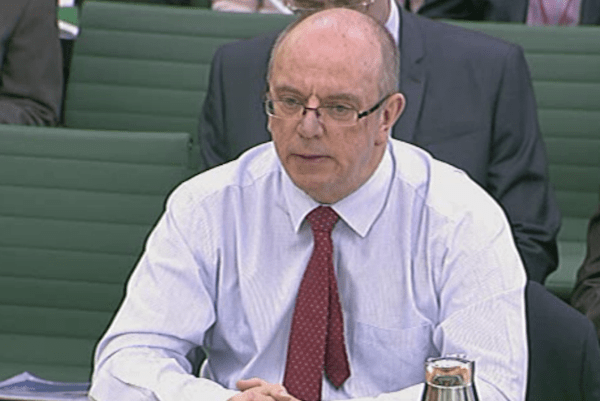Sir David Nicholson didn’t deliver the most confident performance before the Health Select Committee this morning, but he didn’t leave the session looking fatally wounded. Here are the key points from his evidence:
1. No-one knew what was going on.
The NHS is such a big organisation that, as Nicholson admitted, it was perfectly possible for the Strategic Health Authority that he oversaw had no idea that there were concerns about the Mid-Staffordshire Trust. He said:
‘We had no idea, the information was never brought to the SHA… we didn’t see any of the information that would lead you to believe that this was going on, shocking as it is.’
He added that ‘there was no culture of sharing information’. On the mortality rates which should have alerted bosses to problems at Stafford Hospital, he said: ‘Part of the problem was that people got obsessed with the measure.’ There wasn’t a response from the Trust to the high death rates that involved bosses going through notes and examining why more patients were dying at the hospital than expected, he said.
2. Reorganisations have made matters worse.
The size of the NHS was further complicated by repeated reorganisations. Nicholson said:
‘If you look at the organisation of the NHS at the time… what you see is reorganisation on top of reorganisation and what you get out of that is a confusion about accountabilities and a confusion about who is responsible for what.
‘Actually when you added it to the other changes that have happened… it created an environment where the clarity of role simply wasn’t there and the organisations were not capable or had the capacity to make the decisions that were required.’
Whether or not Nicholson was accountable for certain things wasn’t very much clearer by the end of the session than at the start. He explained that he was ‘held to account for delivering the change’, moving three strategic health authorities into one. ‘I accept it was a narrow definition of accountability,’ he said.
3. Nicholson isn’t going anywhere.
And that’s because, in his view, he should stay to guide the current reorganisation. The Committee’s chair Stephen Dorrell suggested recently that this was the reason ministers didn’t want to turn Nicholson into a scapegoat, because he had ‘played a blinder’ for them on the Lansley reforms, and Nicholson today said this:
‘I think I have a duty and a responsibility to manage the organisation over these great changes. I also think that, if you look at my record of what I’ve actually done, you can see that I absolutely get the changes that need to happen to the NHS.’
4. But he was wrong not to meet with relatives.
One of the key regrets the NHS chief executive expressed at the hearing was around the way the NHS – himself included – managed complaints from patients and their relatives. He said that patients were ‘not at the centre’ and that he regretted not meeting the Cure the NHS campaigners when the scandal blew up.
5. Some MPs love a good Select Committee savaging.
Valerie Vaz today showed that even if someone should be held accountable for a disaster as terrible as Mid-Staffs, there are some ways of doing this that aren’t necessarily all that helpful. Here’s one exchange between the Labour MP and Nicholson:
Vaz (initially to Sir Bruce Keogh): That’s the key point, isn’t it, engage with the managerial colleagues. But the person who appointed you, who is sitting next to you, said that he thought clinicians, there were no clinicians present at the board and yet he didn’t do anything about it, so I don’t think you can just blame the consultants for not turning up in the board room. Get cross if you like, Sir David, but I just have a question for you, OK, and this refers back to Mid-Staffordshire and Stafford Hospital. What do you see the role of the directors of public health and did they ever come to you during your time there and say we have concerns about the mortality rate?
Nicholson: I’m sorry, I’m not getting cross about…
Vaz: No, just answer the question, I don’t mind about it, forget about it…
Nicholson: I’m not being, I’m not being…
Vaz: No, I just want you to answer the question.
Nicholson: You’ve made as an aside a comment there, didn’t you, and it wasn’t, I didn’t do nothing about it…
Vaz: But in your evidence…
Nicholson: I set out to the chairman and chief executive what my expectations were about them recruiting a medical director and getting clinicians engaged in their service…
Vaz: And that never happened, and part of our job is to follow up on what happens, lawyers do it all day long, you have to follow up what happened, doctors do it, everyone does it. You didn’t.
Nicholson: I did follow, I did follow…
Vaz: You didn’t!
[Nicholson pulls face of quiet exasperation and looks at the floor].
Vaz: Your evidence doesn’t say you did. But can I just go back to my main point, which is…
There are maulings that are useful to a select committee’s report on an issue, and there are maulings that are useful to an MP’s bid to beat Margaret Hodge to the position of interlocutor of the year without revealing anything particularly enlightening.







Comments